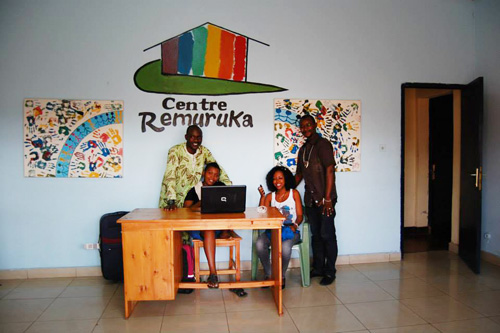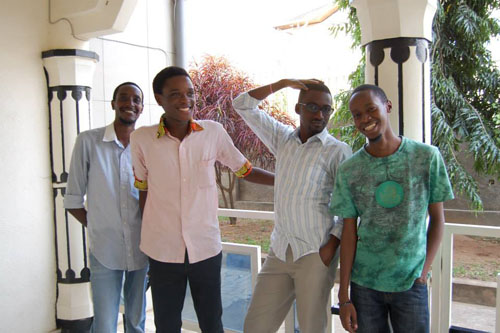Posted by Kent Klindera, April 13, 2015

LGBTI activists gather at Centre Remuruka, an LGBTI advocacy group and community center in Bujumbura, Burundi.
I recently returned from a research preparedness meeting in Kigali, Rwanda, where 25 LGBTI activists and HIV researchers from Rwanda and Burundi came together to discuss research design, questions, and priorities for health and human rights research among GMT individuals in the region. Too often, research performed among LGBTI populations is developed by researchers only. While grounded in science, they often neglect the role community should be playing in designing such studies, only seeking community involvement in the recruitment of research subjects. Due to this the lack of participation, opportunities are often lost to connect the research results with the communities’ advocacy efforts—a link that could result in a more effective HIV response among GMT populations.
To bridge this divide, amfAR has been working with The Center for Public Health and Human Rights at the Johns Hopkins Bloomberg School of Public Health and the International AIDS Vaccine Initiative (IAVI) to connect more researchers with LGBTI community activists and vice versa. In 2011, we collectively developed a research guide called Protect, Respect, Fulfill, which offers concrete actions to overcome the gap between researchers and community leaders. We are currently adding new case studies and action checklists to the document and plan to release the updated guidance later this year.
amfAR and IAVI have also been organizing meetings, like the one in Kigali, in several countries. Last year, we hosted a series of meetings in Kenya that resulted in the formation of a formalized LGBTI research network of both researchers and activists called the G10 that is now working to set research priorities and design studies in Kenya. This year, we have held meetings in Zambia and Rwanda and plan to support similar meetings in Belize, Paraguay, South Africa, and Tajikistan.

Members of GMT Initiative grantee partner MOLI (Mouvement pour les Libertés Individuelles) at the organization’s offices in Bujumbura, Burundi
One of the widest gaps between researchers and the LGBTI activists’ agendas is the fact that the activists represent a community whose ‘lived reality’ is more than just being an HIV disease vector. LGBTI people struggle with societal stigma and discrimination. Especially when living openly as LGBTI, this stigma and discrimination make it very challenging for them to receive a quality education, secure paid employment, maintain familial and romantic relationships, and access quality healthcare. However, from the HIV researchers’ perspective, it is only the health aspect that is important.
LGBTI activists often tune out if they think HIV researchers do not see them in the context of their lives, and I’ve heard them complain that the researchers seem not to care about the community. Similarly, I’ve heard researchers complain that LGBTI activists are not well organized and have unrealistic expectations. In Kigali, I was impressed at the sense of mutual admiration that the activists and researchers had for each other. As I have witnessed at every research preparedness meeting we’ve held, when both parties were brought together, camaraderie was shared, along with mutual understanding and trust.
The meetings also reveal how listening to activists is essential to designing an effective study. For example, in Kigali we discussed how using the word ‘recruit’ can be problematic and stigmatizing when performing research within LGBTI communities, as society accuses LGBTI leaders of ‘recruiting’ others into their ‘lifestyle.’ It was therefore agreed that saying ‘enroll’ or ‘engage’ research participants would be much more appropriate.
I was impressed by how truly engaged the attending activists were. I watched as they began to understand the power that solid research data can offer their advocacy efforts and the impact the community could have on shaping a future research agenda for LGBTI individuals in their area through collaboration with researchers. I was also impressed that the HIV researchers began to understand that HIV is not the most important concern of LGBTI leaders, but that the stigma and discrimination that permeate society and LGBTI individuals’ daily lives takes precedence.
Much of the struggle we have around the HIV response among key populations is because, too often, their humanity is somehow diminished. This may be the consequence of the irrational fear that causes societal homophobia and transphobia, or of seeing community members as data points, not vital voices in the research process. We need more gatherings and processes like this where everyone’s humanity shines through.